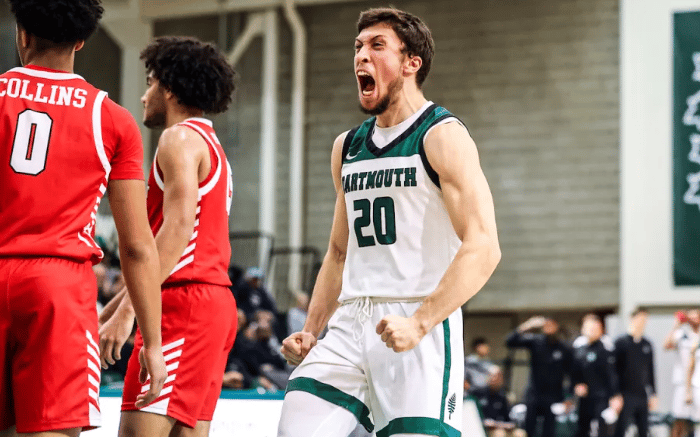- Between Courts
- Posts
- This could change college athletes forever
This could change college athletes forever
The NLRB’S recent ruling concerning Dartmouth's basketball program could drastically shake up the NCAA

Happy Friday! Or Happy Super Bowl weekend for those who celebrate. This is the first year Vegas is hosting a Super Bowl which is a little surprising. But, today also marks the first story that the BC team is covering that is centered around men’s college basketball.
An iconic moment for Vegas, men and BC!
Today we’re diving into the NLRB’s recent ruling that has the potential to throw the NCAA’s traditional playbook right out the window.
Let’s get into it! 👇️


TODAY’S STORY
💥NLRB’S RULING THAT COULD CHANGE NCAA AS WE KNOW IT

BACKGROUND ON TODAY’S STORY
This week, The National Labor Relations Board (NLRB) regional director ruled that Dartmouth men’s basketball players are considered university employees under U.S. labor law, granting them the ability to unionize.
Unionization provides players with negotiating power over salary, as well as aspects like practice hours and travel arrangements.
*The NLRB is responsible for enforcing U.S. labor law regarding collective bargaining.
The significance of the Dartmouth men's basketball team petitioning to join Local 560 of the Service Employees International Union (SEIU) lies in their pursuit of collective bargaining power and representation within the broader labor movement.
Local 560 is a branch of the SEIU, a prominent labor union in the United States representing a diverse range of workers across various industries. They already represents some other employees at Dartmouth, underscoring the existing presence of organized labor within the institution.
This decision reflects a broader trend of athletes seeking to assert their rights and voice within the collegiate sports landscape through collective action and unionization.

THE RULING
The NLRB's decision could have far-reaching implications for college athletics.
Gabe Feldman, a Tulane law professor and NCAA expert notes, "If Dartmouth basketball players are employees, then it’s easy to imagine that all other athletes at the collegiate level would also be considered employees.”
The financial aspect of Dartmouth’s athletic program came under scrutiny.
Dartmouth claimed that their men's basketball program operates at a loss, but attorneys for the players contested this assertion, emphasizing discrepancies in the financial records. Mhmm…
The NCAA and college leaders have actively lobbied for lawmakers to maintain the student status of athletes, rather than employees, to preserve the traditional amateurism model of collegiate sports. This stance is strategic, as it reinforces the NCAA's narrative of prioritizing academics over athletics and avoiding potential disruptions to the current collegiate sports structure.
Feldman notes…”The threat is the loss of control over the ability to restrict compensation to athletes. And we are closer than we've ever been to a system where college athletes not only receive significant additional compensation, but also have a vote in how much compensation they receive."
Looking forward to seeing more custom-made sports cars on campus.

THE IMPACT
For private institutions in the Ivy League, such as Dartmouth, the distinction between student-athletes and employees holds particular significance due to their unique financial structure.
Unlike many public universities in conferences like the SEC, Big 12, Pac-12, and Big Ten, Ivy League schools do not offer athletic scholarships.
Consequently, student-athletes in these old-money institutions rely solely on need-based financial aid and other forms of non-monetary compensation, such as apparel and academic support. This lack of athletic scholarships further complicates the classification of athletes as employees, as their compensation primarily consists of educational benefits rather than traditional wages.
Free clothes vs Monthly paychecks? Tough call
Preserving the student status of athletes reinforces the educational mission of Ivy League schools, emphasizing that athletics supplements rather than replaces academics. Which is one of Dartmouth’s points in the case.
Easy cop out for a program that historically averages 2 wins per year and consistently falls in the back of the pack of their division.

WHAT’S TO COME
Beyond Dartmouth's case, a legal flurry surrounds college sports, reflecting the broader push for change within the NCAA.
Currently, there are ongoing collective action suits in Pennsylvania and a complaint before a different NLRB body in California that claims football and basketball players at USC should be recognized as employees of the school, the Pac-12 Conference and the NCAA.
"Today's landmark NLRB ruling will improve the lives of all college athletes for generations to come," Clark's statement said. "In the history of the sports labor movement, change has always been initiated by the courageous efforts of Players who decided to stand up and demand their fair share."
Rise up Middle Class Black Americans! ✊

Relevant articles from today’s story

⚡️ SPOTLIGHT
Are you feeling a little embarrassed by your shoe closet?
Overtime Kicks can help! They are a newsletter focused on sneaker culture and keeps you up to date with the latest and greatest releases and partnerships.
Subscribe to their newsletter here for a chance to win sneakers like the PUMA All-Pro Nitro Chris Brickley or the Jalen Green Adizero Select 2.0.

Reply